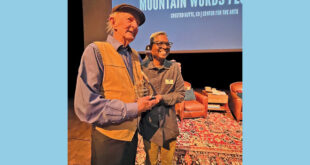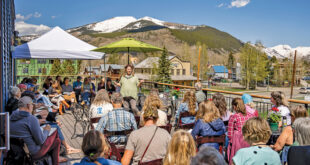“In this little bitty town of Crested Butte, we’ve got all these people working on this issue in Haiti”
By Kendra Walker
It started with Union Congregational Church (UCC) looking for an international organization to partner with that would align with their mission to do good works in the world.
They found Beyond Borders, an organization that is trying to help rural Haitians fight the practice of child domestic servitude, known as “restavek.”
Parents living in rural poverty in Haiti who are unable to provide for their children often send their children to live with an unknown family in the capital city, Port-au-Prince. The child will help perform household chores in return for food, a place to stay and the opportunity to go to school. The parents feel they have no other option and the intention is that the child will have a better life in the city; however, these children often end up abused, neglected and trapped in domestic servitude.
According to a study commissioned by UNICEF, an estimated one in four Haitian children between the ages of five and 17 live apart from their parents, and roughly half of these children end up trapped in domestic servitude. Despite being illegal, restavek is not regulated by the government.
“We were told that about 250,000 Haitian children currently live in restavek,” said UCC member Kate Vogel. “We kept hearing ‘I thought I was sending my child to something better than what I could provide,’ even though that was not the case.
“I was just horrified when I first started hearing and learning about this,” she said. “Haiti is so close to the U.S. and how can we not possibly become involved and try to help?”
Members of the UCC congregation first traveled to Haiti in 2012 to work with Beyond Borders, and made another trip in 2018. During these visits UCC members immersed themselves in remote Haitian villages to learn about the issues the communities face, live with local families, meet restavek survivors, visit school classrooms and help provide support.
“We really wanted them to understand it wasn’t about us being the rich white people trying to come in and do things our own way,” said UCC associate minister Rev. Kelly Jo Clark. “It was about respecting the Haitians, coming alongside them and helping them do what they want to do to improve their country.”
Beyond Borders’ goal is to help change the situations and the community attitudes that allow and encourage restavek, from the ground up. The organization works with the Haitian people to provide them with resources to build grassroots, community-based movements that support the following: creating work opportunities for parents, developing quality, local education for children, ending child slavery and preventing violence against women and girls.
Beyond Borders also focuses on empowering restavek survivors to come forward with their stories and become activists.
“It was so affecting to meet these women and learn about how they’re trying to rebuild their lives,” said Vogel. “They’re doing it the hard way, but a way that might actually work in the long run.”
UCC continues to support Beyond Borders through regular donations and fundraising, and hopes to organize another visit to Haiti in the future.
Artist Donna Rozman is another longtime Crested Butte community member involved in helping local Haitians. Coincidentally in line with UCC’s work with Beyond Borders, Rozman has been helping Haitian women learn skills that will lead to their getting jobs so they can afford to provide for their children, instead of sending them away.
Rozman, who lived in Crested Butte almost 40 years and now lives in Gunnison, first traveled to Haiti in 2013 with a small group of potters to teach local women how to make pottery to earn money. “I never thought my skills as a potter might be helpful to someone in a country like Haiti,” said Rozman.
Through the Haitian non-profit, The Apparent Project, Rozman works with Papillon Enterprise, which helps teach Haitians artisan skills, supports them with full-time jobs and assists in marketing and selling their hand-made goods through the website Papillon Marketplace.
Since her first visit, Rozman has visited Haiti twice more to help teach pottery to new beginners in the program, as well as help women she had previously worked with hone in their skills to make mugs, bowls and plates. The Papillon Enterprise now employs more than 300 local artisans who have all learned a craft to make a living and provide for their families.
“It was really great to see the progression,” said Rozman. “One woman who we taught has become the manager of the potters. She’s now a skilled potter and she can throw mugs faster than I ever could.”
Rozman also explained that the clay the women use in the pottery comes from the central plateau in Haiti and is often used as food by people suffering extreme poverty. They will resort to making clay cookies to feed their malnourished children as an antacid and source of calcium. But now, Rozman has helped some of these Haitians use the clay to feed their children through a more sustainable method.
“It was really wonderful to be involved with this and share my skills as a potter in that way, as opposed to teaching here in the United States,” she said. “When I teach here [in the U.S.], it might change someone’s life but not in the same way. It’s so crucial to them [Haitians] being able to make a living. I think it changed my life and has made an impact.”
When members from UCC learned about Rozman’s work with the Papillon Enterprise, they wanted to collectively share what’s happening in Haiti with the rest of the Crested Butte community. “We didn’t know each other, but we were dealing with the same problems, just in a different way. In this little bitty town of Crested Butte we’ve got all these people working on this issue in Haiti,” said Vogel.
On June 27, the UCC will host an educational event at 6 p.m. at Rumors Coffee and Tea House to inform the community about what’s happening to the people in Haiti. Rozman will speak about her experiences teaching pottery and members from the UCC congregation will share their stories about working with Beyond Borders.
“We would like more people who are interested to learn,” said Vogel. “We want to personalize it and let people know how they can help and work in Haiti.”
“There are huge problems not only in Haiti but around the world,” said Rozman. “I just did a tiny little bit. But if a lot of people do a little bit, it can actually do quite a lot.”
For more information on the June 27 event, contact Kate Vogel at kgvogel@unm.edu or (970) 349-1890.
 The Crested Butte News Serving the Gunnison Valley since 1999
The Crested Butte News Serving the Gunnison Valley since 1999




